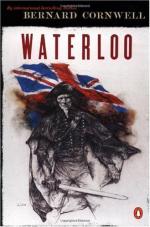
|
| Name: _________________________ | Period: ___________________ |
This test consists of 5 short answer questions, 10 short essay questions, and 1 (of 3) essay topics.
Short Answer Questions
1. Who are the Voltiguers?
2. About what does Rebecque lecture Sharpe?
3. What does Geisenau do?
4. Who is in charge of the Prussian army?
5. With what are the British redcoats' canteens filled?
Short Essay Questions
1. Describe the area where the retreating British army takes up a position in Chapter 10.
2. What gross error in judgment and orders did the Prince of Orange make in Chapter 15?
3. Why, on the third day, are the French still confident of victory?
4. In Chapter 10, what describes a critical decision made by Wellington that ultimately leads to an Allied victory?
5. What charge of heavy cavalry is described in Chapter 15 and what two roles do the horses have?
6. What person and his position, provide a good example of dealing with incompetent superiors?
7. What stops the French from pursuing the retreating British army?
8. What makes Rossendale feel better about himself?
9. What is a major failure on the French part that leads to their ultimate defeat?
10. How does D'Alembord's premonition show courage?
Essay Topics
Write an essay for ONE of the following topics:
Essay Topic 1
In any book centered around the military, leadership of the troops is often crucial with the better leaders able to command the respect and loyalty of their men. The men's willingness to follow a particular leader can have a decisive impact upon the success of a mission. Discuss the following:
1. Whose command style seems most effective? Analyze the elements of those effective leaders thoroughly and discuss the traits of the good leaders. What makes an excellent leader/commander? Give examples.
2. Whose command style seems most ineffective? Analyze the elements of those ineffective leaders thoroughly and discuss the traits of the poor leaders. What makes a poor leader/commander? Give examples.
3. Is disobeying a poor leader ever justifiable? Explain using details from the text, other books you have read and your personal experience. In times of war, disobeying an order can be punishable by death. Is this harsh sentence justifiable for such an act? Why or why not.
Essay Topic 2
Cornwell has tried as much as possible to use historical events and facts around which to weave his work of fiction. Discuss the following:
1. Do you think this book qualifies as an historical fiction? Why or why not?
2. If many of the events in the book are historical, what surprises you about the way the events play out?
3. Do you think the culture of that era is more or less advanced than you imagined? Explain.
Essay Topic 3
Though the author Cornwell may or may not have such personal views on women, the way women are characterized in his series is often less than complimentary. Discuss one of the following:
1. Present and analyze the treatment of women in Sharpe's Waterloo.
2. Cornwell is trying to be historically accurate, so is his treatment of women in his book(s) justified?
3. Is there any way Cornwell could have presented women in a more positive light and still stayed historically accurate? Explain.
|
This section contains 976 words (approx. 4 pages at 300 words per page) |

|




